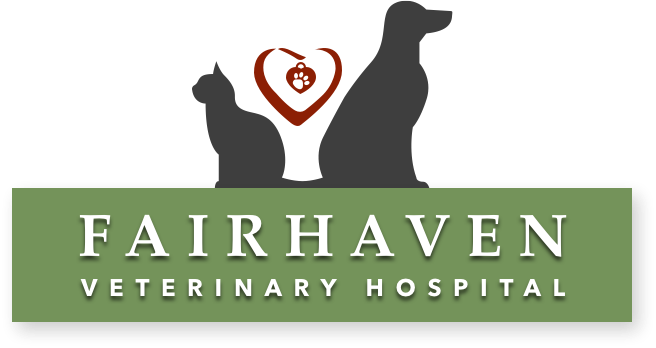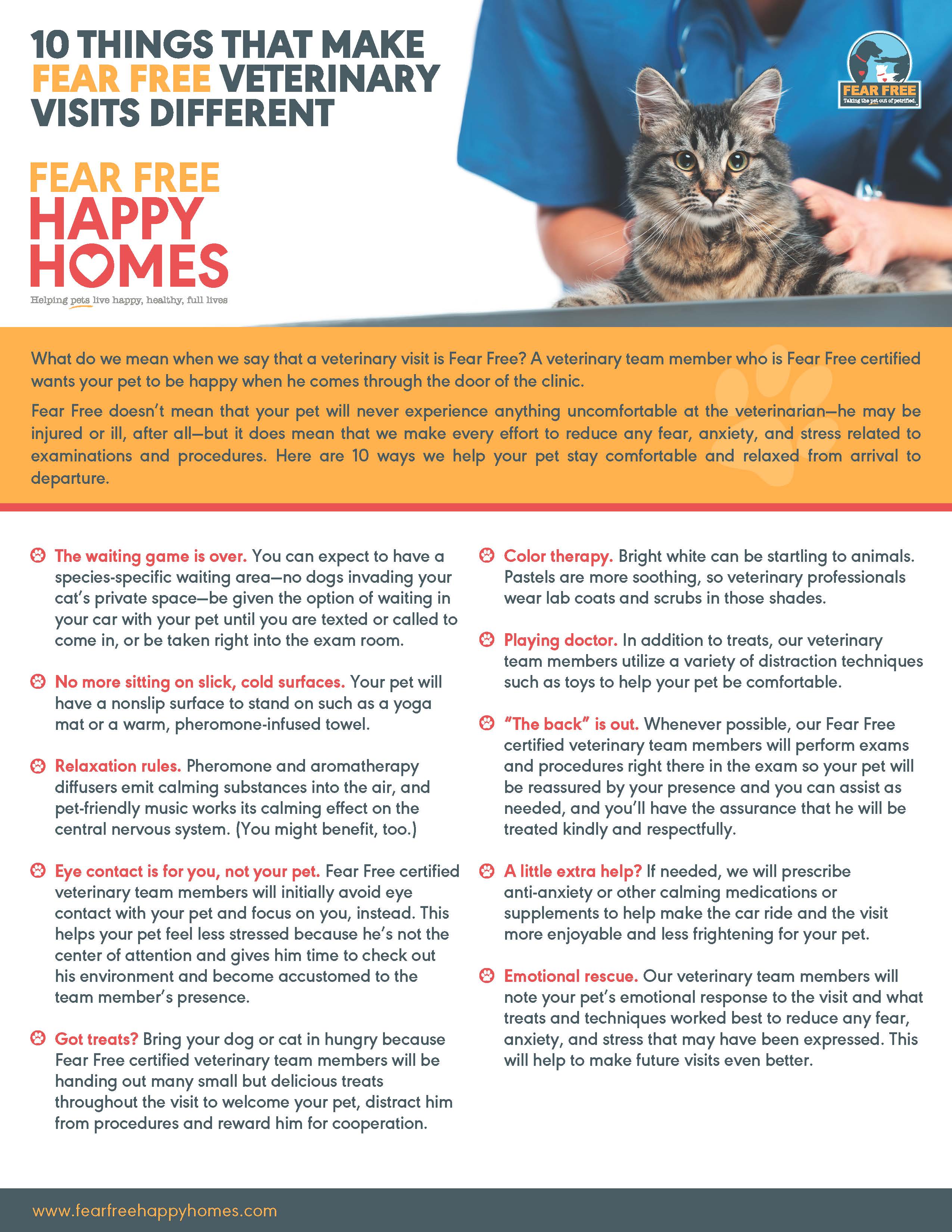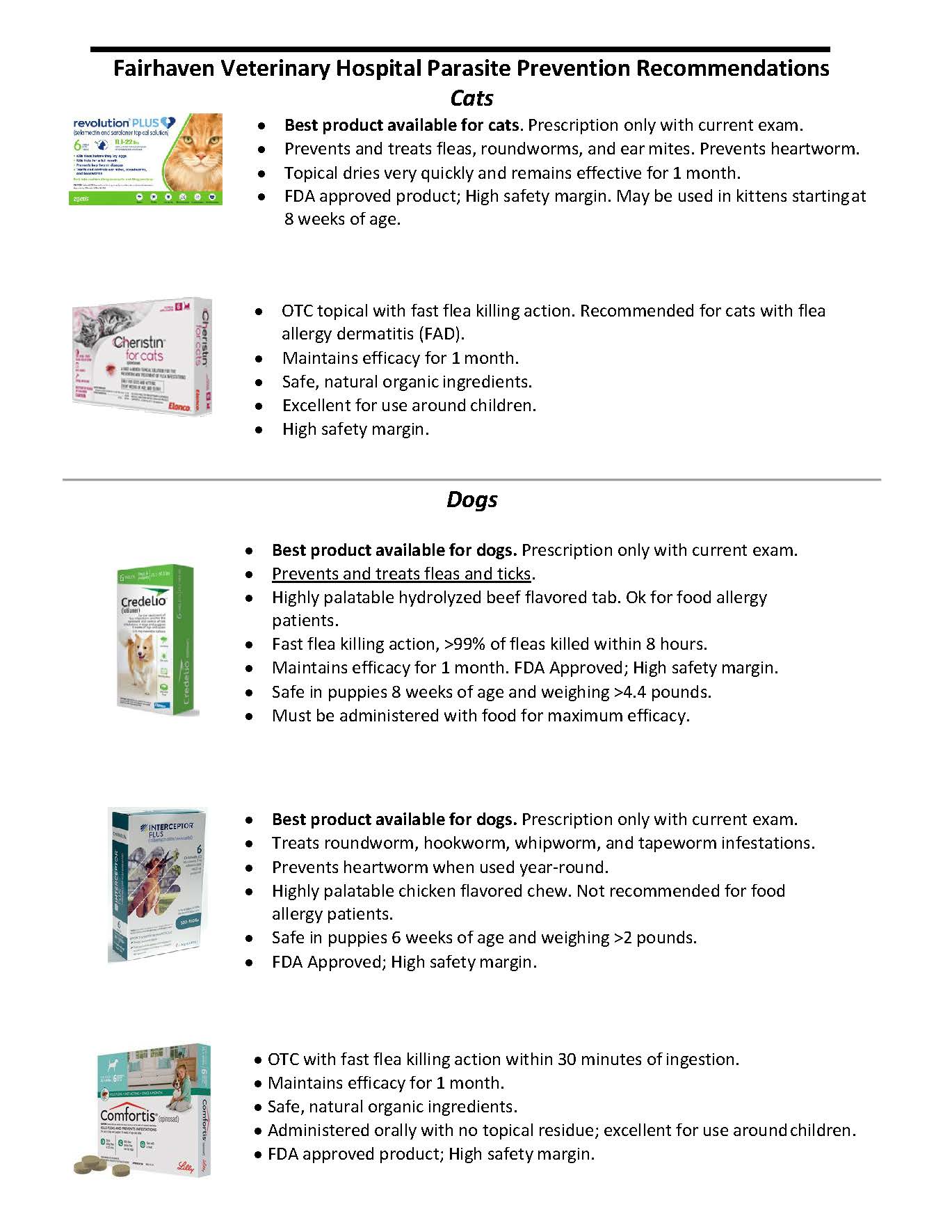Dear Valued FVH Client!
We very much enjoyed meeting you and your recent addition(s) to the family and thank you for entrusting us with all their healthcare needs. Be assured that we will honor that trust by always providing your pets with compassionate and Fear-Free care.
Our modern hospital, well-equipped hospital is capable of meeting the vast majority of the health care needs for your pets. Our doctors and staff maintain excellent, up-to-date medical knowledge and surgical skills through regular medical-journal reading and frequent attendance at continuing education seminars. We also consult regularly with specialists by phone or online to ensure the best possible care and will offer a referral to a boarded specialist when we think your pet’s condition warrants an expert’s attention.
We believe our greatest strength resides in the people we employ to serve you and your pets. Each member of our staff is committed to providing top-notch medical care, personal service, and a compassionate approach to the needs of our clients and patients. We are here because we care about you and your pet, and we hope it shows!
Thank you again for choosing the Fairhaven Veterinary Hospital. If you have any remaining questions, please don’t hesitate to call us. We’re here to help! For more information about our hospital, educational resources, and community information be sure to explore our entire website.
Respectfully yours,
The Doctors and Staff at Fairhaven Vet
Follow us on Facebook, Instagram and Twitter!
FVH CLIENT POLICIES
- Appointments are scheduled for 30 minutes so that we may devote ample time to each and every patient. Cancellation of appointments must be 24 hours before scheduled visit. Two no-show appointments will result in low priority scheduling or drop-off only status.
- Late arrivals will be seen up to 10 minutes after scheduled visit; however, the overall visit may be shortened so that we may stay on schedule as a courtesy to other clients. Late arrivals of greater than 10 minutes will need to reschedule unless our schedule can accommodate.
- Our hours of operation are from 8 a.m.-6:30 p.m. M-F. We have appointment priority scheduling and do not have the ability to take walk-in appointments. We want to make sure we are here when you need us most, as such, we will offer drop off appointments when needed to work patients in between appointments. Surgeries and dental cleanings are offered M-F with drop off times between 7:30 a.m.-8:30 a.m. Most surgical release times are scheduled between 4 p.m.-5:30 p.m.
- Payment for service is expected at the time of visit. We do not offer billing or held checks. Scratchpay loans are available to those who qualify. We accept Cash, Debit, Visa, MasterCard, American Express, Discover Cards, and CareCredit. Estimates are available before any procedure, please inquire before services provided. Please see financial policy sheet attachment for more details.
- Scratchpay is a wonderful tool to help you afford veterinary care, allowing for payment plans out to 24 months on approved credit. The service provides a 30 day no interest option and very quick approval before you even arrive to the hospital, allowing you and the Veterinarian to make the best medical decisions for your beloved pet. Please inquire for details.
- Prescription refill requests require at least 48 hours advance notice so that we may verify authorized refills with the attending Veterinarian. We completely understand the convenience of mail order for drug refills, diets and flea products. Our online store is available 24 hours a day for your shopping convenience. Prices are competitive against many on-line retailers and all products purchased through our store carry any current manufacturer’s guarantee, unlike non-veterinary retailers. Please be sure to allow plenty of time for prescription refill request authorization by the attending DVM and package transit time when utilizing the online store.
- We will see emergency appointments during our regular business hours. All after hour emergencies should contact the Animal Emergency Clinic (AEC) at 360-758-2200.
- Our website www.fairhavenvet.com is a great resource for medical information and pre-appointment forms. In addition, our PetDesk smart phone app allows you access to your pet’s important medical information and provides an option for you to make appointment and prescription refill requests 24 hours a day, when it is most convenient for you!
FINANCIAL POLICY
Thank you for choosing the Fairhaven Veterinary Hospital. Our primary mission is to deliver the most comprehensive and compassionate veterinary care available for your pet. An important part of this mission is making the cost of optimal care as easy and manageable for our clients as possible by offering several payment options.
Clients are encouraged to consider pet insurance as a tool to manage unforeseen medical emergencies. The independent website, petinsurancereview.com, offers user reviews and insight into many different insurance companies.
Payment Options:
Fairhaven Veterinary Hospital requires payment in full at time of surgical/inpatient discharge or outpatient service completion.
You can choose from:
- Preferred Payment Methods
– Cash, Visa®, MasterCard®, American Express®, Discover Card®, CareCredit®
- Alternate Payment Methods (details available on request)
– Scratchpay®1
Additional Policy Information:
Fairhaven Veterinary Hospital charges $35 for returned checks. For clients with pet insurance, we are happy to provide you with the necessary documentation to submit a claim to your insurance carrier. If you have any questions, please do not hesitate to ask. We are here to provide the best veterinary care available for your pet.
¹Subject to credit approval
KITTEN/CAT CARE RECOMMENDATIONS
Vaccinations: Continue vaccinations every 3-4 weeks until 16 weeks old. The final 2 boosters should be given after 12 weeks of age to ensure a strong immune response.
FeLV/FIV testing: We recommend this simple blood test for all kittens coming from unknown background, or with a mother that has not been tested to ensure that they are not carrying these fatal and highly contagious diseases. Symptoms of these diseases are sometimes not seen until later in life. Feline Leukemia vaccination is recommended for all kittens that may have ANY outdoor exposure, after they have already tested negative.
- Kittens should be routinely dewormed every 2- 4 weeks for at least 4 treatments to eliminate common internal parasites. Please give the Strongid dewormer as prescribed.
- Please bring a fecal sample in the coming week for analysis to ensure all parasites are being treated.
Nutrition: We recommend feeding high-quality kitten food twice daily (three times daily for kittens less than 3 months of age). A scant ¼ cup of dry food twice daily, plus a small canned-food treat daily is recommended life-long. At 1-year of age, your kitten should be transitioned to a high quality adult maintenance diet. We highly recommend Hill’s T/D (Tartar Diet) – this food is excellent nutritionally, and reduces tartar and gum disease by 50-70% by gently scrubbing the teeth every time your cat chews. Feeding this diet is an easy way to preserve oral health in your cat, when brushing teeth may be difficult.
Flea/Parasite Control: Outdoor cats and kittens should have monthly Revolution Plus applied topically to prevent fleas and internal parasites year-round. Indoor-only cats are still able to be infested by fleas travelling into the home through walls (apartments and duplexes), on shoes or clothing and on other pets (dogs or indoor-outdoor cats). Households with young children or immuno-compromised persons are strongly recommended to keep all pets on year-round parasite and flea protection to prevent human health concerns.
Spaying/Neutering: Male cats should be neutered, and female cats should be spayed between 5-6 months of age. In addition to helping limit the severe pet overpopulation crisis, spaying and neutering helps to prevent urine marking and other undesirable behaviors in males, and the increased “yowling” of female cats in heat.
Dental Care: Healthy adult cats should receive their first comprehensive dental exam and dental cleaning starting at 4 years of age.
Permanent Identification: We recommend that a microchip be placed under your kitten’s skin to help ensure that she is rapidly returned to you if ever lost. This can be done at the time of spaying/neutering if being done at 5-6 months of age, or can be done at one of the early kitten visits in animals where spay/neuter is going to be postponed. A microchip is recommended even for kittens that are not intended to go outdoors.
Indoor- only vs. indoor- outdoor lifestyle: We recommend that you consider keeping your cat indoors only. On average, indoor cats live much longer lives, and have many fewer traumas and medical problems than cats who go outdoors. Cats can live very full and enjoyable lives indoors only. The “Indoor Pet Initiative” on the Ohio State University webpage (indoorpet.osu.edu) has great information about enriching the environment for your indoor cat. Cats that are allowed outdoors can be kept safer by establishing a routine of coming in at night, when most cases of trauma occur.
Pet Health Insurance: Now is the time to investigate Pet Health Insurance if you have any interest. The website, petinsurancereview.com is an excellent resource for comparing coverage and premiums.
BEHAVIOR
Litterbox training and care: The vast majority of kittens take to the litterbox on their own. Litterboxes should be placed in a safe, easily-accessible location and should be easy for your cat to use (some cats prefer an open-box rather than a covered-box). We recommend fine, clumping, unscented, dust-free cat litter. There should be one litterbox per cat in the home, plus one additional. Feces and urine should be scooped daily to encourage good, ongoing litterbox use.
Scratching behavior and claw care: Cats and kittens NEED to scratch- it is part of their innate nature. It is important to provide various scratching objects, and to appropriately train your kitten where and where-not to scratch. Traditional vertical scratching posts and horizontal scratching surfaces (made of sisal-cord, carpet, or cardboard) should be placed prominently in the home environment where cats want to scratch. If your kitten is scratching furniture, Feliscratch© is a proven product containing catnip and appeasing pheromones which can be applied to appropriate scratching areas to train your cat or kitten to scratch where you want them to. It does take a little time, but positively rewarding them when they scratch in the right place will encourage them to continue that behavior. Try to match the scratching posts/ objects that you offer, to your cats individual scratching preferences. For example if they prefer to scratch on the carpet, provide a carpeted scratching post. We also recommend trimming your cat’s toenails monthly to help prevent damage around the house- this is not a difficult procedure and we are happy to demonstrate! Much more information is available at Feafreehappyhomes.com and indoorpet.osu.edu.
Playtime: Kittens have exuberant energy and need constructive playtime to prevent unwanted behaviors. Throwing small toys (may kittens will quickly learn to fetch), having kittens chase the sash of a bathrobe or other thick cord, and using a small flashlight or laser pointer on the wall (not in the eyes!) all work very well. Prevent access to rubber bands, and small toys that kittens may swallow. Also prevent access to string, thread, dental floss, tinsel/ribbon- these commonly cause intestinal obstruction, requiring surgery, if swallowed. Kittens may occasionally “attack” our hands/feet- this is rarely true aggression but truly just exuberant play behavior. Simply end the interaction and re-direct your kitten to more appropriate play objects.
Other Resources: Much more information about health and behavior issues can be found at the following websites:
- https://fearfreehappyhomes.com/
- https://indoorpet.osu.edu/cats
- http://www.vet.cornell.edu/fhc/
- You can find links to these sites and other helpful information via our resources tab
FVH ADDITIONAL RECOMMENDATIONS
- Nutrition is one of the most key elements of a pet’s good health. We recommend a quality balanced diet be fed based on your pet’s recommended ideal body weight established by your Veterinarian. Dogs may be fed dry or canned as desired and the total recommended daily volume may be broken up into multiple meals. Cats may be fed dry or canned, but we do encourage those cats receiving dry only to also be offered some canned each week. This can be important as many senior cats may require a change to a canned diet as they age. Fresh water should always be available. Calorie content of treats should be factored into total daily intake; if desired, you may wish to hold aside a portion of the daily feed and give as a treat. Maintaining the ideal weight is important in preventing diseases associated with obesity such as arthritis, heart disease, and diabetes.
- For additional recommendations on quality diets available for your pet, we trust the Pet Stop, located in Sehome Village, to guide your decision-making process. Our LVT staff would be happy to review any diet you currently feed for nutritional quality, balance, and volume to feed.
- Training and socialization are very important to the well-being of your dog at any age. Embarking Dogs, Tails-a- Wagging, Nichols Dog and Animal Training, and Confident Canine Puppy Training are all aversive free, positive reinforcement trainers providing comprehensive puppy and adult dog training. Check out our website for other recommended trainers who use positive, reward-based training methods congruent with our Fear Free mission.
- Undesirable behavior issues in dogs and cats can occur at any age and may be very frustrating to an owner. Often we can offer recommendations for altering behaviors through a consultation with our doctors or licensed veterinary technicians. Our recommendations for training systems and guides can be found through Dr. Sophia Yin’s veterinary behaviorist website at drsophiayin.com. Please also check out fearfreehappyhomes.com for information on understanding your pets’ body language, behavior, and other tips. Free and paid subscriptions are available.
- Why buy your prescription drugs and flea medications from Fairhaven Veterinary Hospital?
-
- FVH purchases all of our drugs and prescription flea products directly from the manufacturer. Online pharmacies often get their product through diversion from domestic or foreign sources. Proper handling of product while in the possession of diverters cannot be guaranteed.
- FVH will not sell expired medications. Some online pharmacies have been found to sell outdated or short dated product.
- Manufacturers will only guarantee certain products in the event of an adverse reaction when purchased directly from a licensed veterinarian. Pharmaceutical manufacturers strongly believe their products will be used correctly only when discussed with trained veterinary staff. Human Pharmacies and online retailers do not have pharmacists trained in veterinary pharmacology; they are unfamiliar with how very different companion animals are from human patients.
- FVH is a family owned business that has been a proud member of the local community. We provide local jobs, maintain high ethical standards, support many local non-profits, and work to create a client focused experience based on compassion.
FVH Parasite Detection and Prevention Guidelines
DETECTION (Fecal microanalysis)
- Puppies and Kittens- Test at initial visit and again at 6-18 months of
- Adult Dogs and Cats
- Annual fecal analysis for all patients.
- Fecal performed whenever abnormal feces or unexplained weight loss present.
- Dogs that frequent a boarding kennel, play facility or dog park should be tested regularly or as required by the organization.
- Cats and dogs on parasite prevention products should still be fecal tested annually to detect Giardia, Coccidia, and other less common parasites that are not cleared by current prevention products.
- Clients should provide a fresh sample in a baggie or small container; generally, a 3oz. sample is sufficient. Results are available within 24-48 hours.
PREVENTION (Deworming and Parasite Prevention Products)
- Puppies and Kittens
- Prophylactic deworm at 2, 4, 6 and 8 weeks of age, then deworm monthly until 6 months of age.
- Adult Dogs and Cats
- Year round use of parasite prevention products are recommended for all dogs (Interceptor Plus), outdoor cats, and indoor-only cats that live in a household with dogs or young children (Revolution Plus).
Common parasites to our area:
- Fleas/Ticks– Treat monthly with Credelio, orally (Dogs) or Revolution Plus, topically (Cats). Pets should be treated year-round since our winters are not harsh enough to suppress flea and tick populations. Infestation may lead to allergic dermatitis, anemia, itching and, in rare cases, serious disease for companion animals. Severe infestation may also require treatment of environment.
- Heartworm- Heartworm is a serious disease that results in severe lung disease, heart failure, other organ damage, and death in pets, mainly dogs, cats, and ferrets. It is caused by a parasitic worm called Dirofilaria immitis. The worms are spread through the bite of a mosquito. Climate change is increasing the potential for heartworm in the Pacific Northwest.
- Roundworms- Primary route of infection is via mother at birth, direct ingestion via the environment or ingestion of infected vertebrate host. Can occur in cats throughout life, but less common in adult dogs. Children and individuals with suppressed immune systems at higher risk for transmission and can lead to serious medical disorders.
- Coccidia- Protozoa with primary route of infection coming from contaminated environment or ingestion of contaminated host; People are not considered at risk for transmission. To prevent do not allow ingestion of wild animals and solicit only properly cleaned pet facilities.
- Tapeworms- Various species are prevalent and infection typically via ingestion of fleas or contaminated host. Can be a zoonotic, although rarely causes serious human medical concerns.
- Giardia- Differing forms affect cats, dogs and people with transmission between groups not currently demonstrated. Infection is through direct fecal-oral contact with cysts or contaminated water source/environment.
- Toxoplasmosis- A very serious zoonotic disease transmitted through the feces of infected cats to humans. Prevention in cats is best achieved by not allowing hunting of wild animals that may be infected, ingestion of raw or undercooked meat, and daily removal of feces from litter box. Pregnant women and immunosuppressed individuals should avoid cleaning of litter boxes and wear gloves when gardening to avoid exposure to cat feces. Additional recommendations are available at www.capcvet.org.



